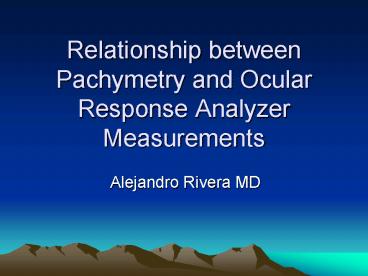Relationship between Pachymetry and Ocular Response Analyzer Measurements - PowerPoint PPT Presentation
1 / 12
Title:
Relationship between Pachymetry and Ocular Response Analyzer Measurements
Description:
... is one of the most widely used devices to evaluate the ocular rigidity by means ... The data were taken from files of patients evaluated for refractive surgery. ... – PowerPoint PPT presentation
Number of Views:127
Avg rating:3.0/5.0
Title: Relationship between Pachymetry and Ocular Response Analyzer Measurements
1
Relationship between Pachymetry and Ocular
Response Analyzer Measurements
- Alejandro Rivera MD
2
- Alejandro Rivera MD
- Private Practice. Mexico City.
- dralexrg_at_prodigy.net.mx
- Dr. Rivera does not have a financial or
propietary interest in any material or method
mentioned.
3
The ultrasonic pachymeter is one of the most
widely used devices to evaluate the ocular
rigidity by means of the measurement of the
central corneal thickness (CCT). The Ocular
Response Analyzer (ORA) is a device developed by
David A. Luce, PhD and Reichert Inc. to determine
in vivo biomechanical properties of the cornea
(1). It has been used to estimate refractive
surgery outcomes and to study intraocular
pressure measurement interference.
4
The ORA produces two measurements of corneal
biomechanical properties. The corneal hysteresis
(CH) refers to the energy lost during the
stress-strain cycle and is a measurement of the
viscoelastic behavior of the corneal tissue. The
corneal resistance factor (CRF) is a measurement
of the elastic properties of the cornea (2).
5
Low values of CCT, CH and CRF have been found in
keratoconic eyes (3,4). Previous studies have
shown the statistical correlation of the CH, the
CRF and the CCT (5). Can the CCT alone give us an
evaluation of the biomechanical propeties of the
cornea? This study was performed to evaluate the
clinical relationship between these measurements.
6
MATERIALS AND METHODS. A total of 815 eyes of
408 patients were studied. The data were taken
from files of patients evaluated for refractive
surgery. Eleven patients with clinical and
topographic diagnosis of keratoconus were
excluded. The Ocular Response Analyzer (Reichert
Corporation, Depew, USA) was used to determine
the CH and the CRF. An ultrasonic pachymeter
(CompuScan P Model UPC 1000 Storz Instrumens Co.
St Louis USA) was used to measure the CCT. The
statistical analysis was performed using the
Analise-it for Microsoft Excel program (Version
2.07, Analise-it Software, Ltd. Leeds, UK).
7
RESULTS. Relationship between CCT and CRFThe
relationship was significant (p lt
0.0001)Correlation coefficient r 0.52
8
RESULTS. Relationship between CCT and CHThe
relationship was significant (p lt
0.0001)Correlation coefficient r 0.44
9
RESULTS. Bland-Almand plot.CR and CH are not
measures of the same parameter.
10
DISCUSSION
- Elasticity refers to how a material deforms in
response to stress. The cornea has a non-linear
elastic response. Viscous materials do not regain
their original shape immediately when the stress
is removed. Hysteresis refers to the energy lost
when the stress is removed from a viscous
material (6). As with most biological materials,
collagen is viscoelastic and therefore shows
hysteresis. - The results of this study demonstrated that the
correlation of the CCT measurements with the CRF
was stronger than the correlation between CCT
measurements and the CH. This means that the CCT
is more correlated with the elastic properties of
the cornea than with the viscoelastic behavior of
the corneal tissue.
11
- The ultrasonic pachymeter is one of the most
widely used devices to estimate the central
corneal thickness in the clinical setting, but it
may not be the best device to evaluate the
biomechanical properties of the cornea. This
could explain why some patients with an average
preoperative corneal thickness develop corneal
ectasia. Although it has been said that the CH as
measured by the Ocular Response Analyzer is not
the best predictor of keratoconus (7) it is my
opinion that the analysis of all the information
we can gather from our patients will give us the
best results in our practice.
12
REFERENCES
- Luce DA. Determining in vivo biomechanical
properties of the cornea with an ocular response
analyzer. J Cataract Refract Surg 2005
31156-162. - Kotecha A. What biomechanical properties of the
cornea are relevant for the clinician? Surv
Ophthalmol 2007 52 Suppl 2 S109-S114. - Kerautret J, Colin J, Touboul D, Roberts C.
Biomechanical characteristics of the ectatic
cornea. J Cataract Refract Surg 2008 34
510-513. - Ortiz D, Piñero D, Shabayek MH et al. Corneal
biomechanical properties in normal, post-laser in
situ keratomileusis, and keratoconic eyes. J
Cataract Refract Surg 2007 331371-1375. - 5. Shah S, Laiquzzaman M, Cunliffe I, Mantry S.
The use of the Reichert ocular response analyzer
to establish the relationship between ocular
hysteresis, corneal resistance factor and central
corneal thickness in normal eyes. Contact Lens
Anterior Eye 2006 29 257-262. - 6. Dupps WJ. Hysteresis new mechanospeak for
the ophthalmologist. J Cataract Refract Surg
2007 33 1499-1501. - 7. Shah S, Laiquzzaman M, Bhojwani R, et al.
Assessment of the biomechanical properties of the
cornea with the Ocular Response Analyzer in
normal and keratoconic eyes. Invest Ophthalmol
Vis Sci 2007 48 3026-3031.































